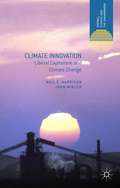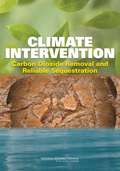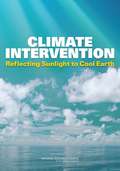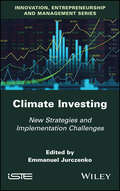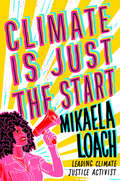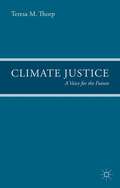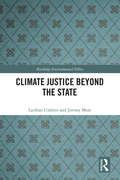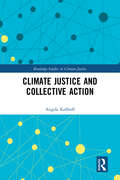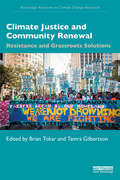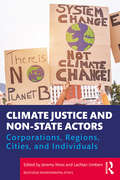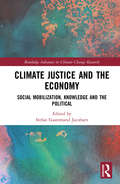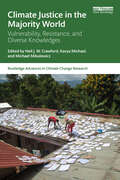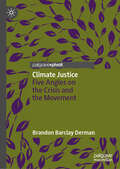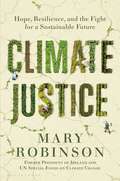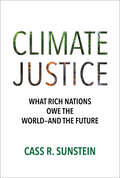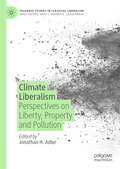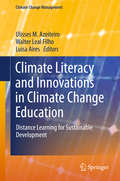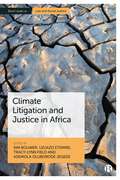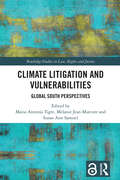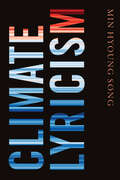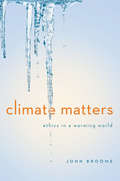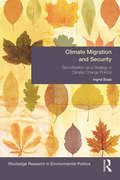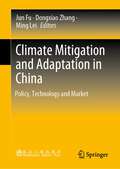- Table View
- List View
Climate Innovation
by John Mikler Neil E. HarrisonA comprehensive examination of the inability of liberal capitalism to generate the technological innovations necessary to prevent dangerous climate change. The case is made for the need for institutional evolution to drive the climate innovation, and the potential for climate innovation in an increasingly economically interconnected world.
Climate Intervention: Carbon Dioxide Removal and Reliable Sequestration
by Committee on Geoengineering Climate: Technical Evaluation Discussion Of ImpactsThe signals are everywhere that our planet is experiencing significant climate change. It is clear that we need to reduce the emissions of carbon dioxide and other greenhouse gases from our atmosphere if we want to avoid greatly increased risk of damage from climate change. Aggressively pursuing a program of emissions abatement or mitigation will show results over a timescale of many decades. How do we actively remove carbon dioxide from the atmosphere to make a bigger difference more quickly? As one of a two-book report, this volume of "Climate Intervention" discusses CDR, the carbon dioxide removal of greenhouse gas emissions from the atmosphere and sequestration of it in perpetuity. "Climate Intervention: Carbon Dioxide Removal and Reliable Sequestration" introduces possible CDR approaches and then discusses them in depth. Land management practices, such as low-till agriculture, reforestation and afforestation, ocean iron fertilization, and land-and-ocean-based accelerated weathering, could amplify the rates of processes that are already occurring as part of the natural carbon cycle. Other CDR approaches, such as bioenergy with carbon capture and sequestration, direct air capture and sequestration, and traditional carbon capture and sequestration, seek to capture CO2 from the atmosphere and dispose of it by pumping it underground at high pressure. This book looks at the pros and cons of these options and estimates possible rates of removal and total amounts that might be removed via these methods. With whatever portfolio of technologies the transition is achieved, eliminating the carbon dioxide emissions from the global energy and transportation systems will pose an enormous technical, economic, and social challenge that will likely take decades of concerted effort to achieve. "Climate Intervention: Carbon Dioxide Removal and Reliable Sequestration" will help to better understand the potential cost and performance of CDR strategies to inform debate and decision making as we work to stabilize and reduce atmospheric concentrations of carbon dioxide.
Climate Intervention: Reflecting Sunlight to Cool Earth
by Committee on Geoengineering Climate: Technical Evaluation Discussion Of ImpactsThe growing problem of changing environmental conditions caused by climate destabilization is well recognized as one of the defining issues of our time. The root problem is greenhouse gas emissions, and the fundamental solution is curbing those emissions. Climate geoengineering has often been considered to be a "last-ditch" response to climate change, to be used only if climate change damage should produce extreme hardship. Although the likelihood of eventually needing to resort to these efforts grows with every year of inaction on emissions control, there is a lack of information on these ways of potentially intervening in the climate system. As one of a two-book report, this volume of "Climate Intervention" discusses albedo modification - changing the fraction of incoming solar radiation that reaches the surface. This approach would deliberately modify the energy budget of Earth to produce a cooling designed to compensate for some of the effects of warming associated with greenhouse gas increases. The prospect of large-scale albedo modification raises political and governance issues at national and global levels, as well as ethical concerns. "Climate Intervention: Reflecting Sunlight to Cool Earth" discusses some of the social, political, and legal issues surrounding these proposed techniques. It is far easier to modify Earth's albedo than to determine whether it should be done or what the consequences might be of such an action. One serious concern is that such an action could be unilaterally undertaken by a small nation or smaller entity for its own benefit without international sanction and regardless of international consequences. Transparency in discussing this subject is critical. In the spirit of that transparency, "Climate Intervention: Reflecting Sunlight to Cool Earth" was based on peer-reviewed literature and the judgments of the authoring committee; no new research was done as part of this study and all data and information used are from entirely open sources. By helping to bring light to this topic area, this book will help leaders to be far more knowledgeable about the consequences of albedo modification approaches before they face a decision whether or not to use them.
Climate Investing: New Strategies and Implementation Challenges
by Emmanuel JurczenkoClimate Investing: New Strategies and Implementation Challenges
Climate Is Just the Start: . .
by Mikaela LoachA guide to tackling the climate crisis from a prominent activist working on the front lines! Mikaela Loach's approach is one of HOPE and big-hearted optimism, inspiring kids and making them feel truly empowered to change the world.Kids hear about the climate crisis pretty much every day. From their parents, from their teachers, on social media, and in the news, there is no escaping it. Against a broader backdrop of social inequity and unfairness, it's easy for young people to feel a sense of "doom and gloom" about everything and to feel powerless. In CLIMATE IS JUST THE START, UK-based climate activist Mikaela Loach offers her urgent and inspiring message for kids who want to STOP the climate crisis and START building a better world for everyone. Mikaela explains the climate crisis and its broader social implications through personal stories about her activism journey. She writes about friends from around the world who are experiencing the worst of it today and about what they are doing to fight back. She delivers a message or not only hope, but of excitement for the opportunity to create not only a sustainable future for Earth, but better lives for people in the process.Mikaela is truly on the front lines of the climate movement: leading street protests, confronting fossil fuel executives, taking the UK government to court, and speaking up to those in power. Not only will kids love engage with her style, they will be inspired by her example.
Climate Justice
by Teresa M. ThorpIn this ground-breaking work, Teresa Thorp tackles the causes and effects of climate injustice by methodically mapping out an approach by which to reach a negotiated consensus with legal force to protect present and future generations. Using the law and policy of climate change as a vehicle for illustrating how to shape our future, she comprehensively overturns the widely held contemporary view of climate justice as inconstant charitable acts, relative systemic notions and static concepts isolated from the common good and a congruent rule of law. Responding to the adverse impacts of climate change (heat waves, extended drought, severe flooding and desertification), which represent an urgent and potentially irreversible threat to human societies and the planet, requires a new and cohesive way of thinking about global policy and the law. The mission of guaranteeing and realising human dignity, human security and human rights is multi-fold. Looking through the lens of kaleidoscopic normativity, an extensible language anchored in common juridical elements should facilitate how norms enter the socio-legal frame and interact within it. Users need to be able to display and interpret the congruent legal norm in order to obey and apply it. Galvanising this process by constitutionalising first principles and consequential norms is vital for attaining fraternity between nations and among all people. Climate Justice - A Voice for the Future is an essential read for scholars, practitioners and all those genuinely interested in reaching consensus on a post-2015 global climate accord, a unified development agenda and a cohesive pact for disaster-risk reduction.
Climate Justice Beyond the State (Routledge Environmental Ethics)
by Jeremy Moss Lachlan UmbersVirtually every figure in the climate justice literature agrees that states are presently failing to discharge their duties to take action on climate change. Few, however, have attempted to think through what follows from that fact from a moral point of view. In Climate Justice Beyond the State, Lachlan Umbers and Jeremy Moss argue that states’ failures to take action on climate change have important implications for the duties of the most important actors states contain within them – sub-national political communities, corporations, and individuals – actors that have been largely neglected in the climate justice literature, to date. Sub-national political communities and corporations, they argue, have duties to immediately, aggressively, and unilaterally reduce their emissions. Individuals, on the other hand, have duties to help promote collective action on climate change. Along the way, they contribute to a range of important contemporary debates, including those over the nature of collective duties, what agents are required to do under conditions of partial compliance, and the requirements of fairness. Targeted at academic philosophers working on climate justice, this book will also be of great interest to students and scholars of global justice, applied ethics, political philosophy, and environmental humanities.
Climate Justice and Collective Action (Routledge Studies in Climate Justice)
by Angela KallhoffThis book develops a theory of climate cooperation designed for concerted action, which emphasises the role and function of collectives in achieving shared climate goals. In debates on climate change action, research focuses on three major goals: on mitigation, on adaptation and on transformation. Even though these goals are accepted, concerted action is still difficult to realize. Climate Justice and Collective Action provides an analysis of why this is the case and develops a theory of climate cooperation designed to overcome the existing roadblocks. Angela Kallhoff starts with a thorough analysis of failures of collective action in the context of climate change action. Taking inspiration from theories of water cooperation, she then establishes a theory of joint action that reframes climate goals as shared goals and highlights the importance of adhering to principles of fairness. This also includes an exploration of the normative claims working in the background of climate cooperation. Finally, Kallhoff puts forward proposals for a fair allocation of duties to cooperate with respect to climate goals. This book will be of great interest to students and scholars of climate action, climate justice, environmental sociology and environmental philosophy and ethics more broadly.
Climate Justice and Community Renewal: Resistance and Grassroots Solutions (Routledge Advances in Climate Change Research)
by Brian Tokar Tamra GilbertsonThis book brings together the voices of people from five continents who live, work, and research on the front lines of climate resistance and renewal. The many contributors to this volume explore the impacts of extreme weather events in Africa, the Caribbean and on Pacific islands, experiences of life-long defenders of the land and forests in Brazil, India, Indonesia, and eastern Canada, and efforts to halt the expansion of fossil-fuel infrastructure from North America to South Africa. They offer various perspectives on how a just transition toward a fossil-free economy can take shape, as they share efforts to protect water resources, better feed their communities, and implement new approaches to urban policy and energy democracy. Climate Justice and Community Renewal uniquely highlights the accounts of people who are directly engaged in local climate struggles and community renewal efforts, including on-the-ground land defenders, community organizers, leaders of international campaigns, agroecologists, activist-scholars, and many others. It will appeal to students, researchers, activists, and all who appreciate the need for a truly justice-centered response to escalating climate disruptions.
Climate Justice and Disaster Law
by Rosemary LysterClimate disasters demand an integration of multilateral negotiations on climate change, disaster risk reduction, sustainable development, human rights and human security. Via detailed examination of recent law and policy initiatives from around the world, and making use of a capability approach, Rosemary Lyster develops a unique approach to human and non-human climate justice and its application to all stages of a disaster: prevention; response, recovery and rebuilding; and compensation and risk transfer. She comprehensively analyses the complexities of climate science and their interfaces with the law- and policy-making processes, and also provides an in-depth analysis of multilateral climate change negotiations under the 1992 United Nations Framework Convention on Climate Change.
Climate Justice and Historical Emissions
by Meyer Lukas H. Pranay SanklechaThis volume investigates who can be considered responsible for historical emissions and their consequences, and how and why this should matter for the design of a just global climate policy. The authors discuss the underlying philosophical issues of responsibility for historical emissions, the unjust enrichment of the earlier developed nations, as well as questions of transitional justice. By bringing together a plurality of perspectives, both in terms of the theoretical understanding of the issues and the political perspectives on the problem, the book also presents the remaining disagreements and controversies in the debate. Providing a systematic introduction to the debate on historical emissions and climate change, this book provides an unbiased and authoritative guide for advanced students, researchers and policymakers in climate change justice and governance, and more widely, for anyone interested in the broader issues of global justice.
Climate Justice and Non-State Actors: Corporations, Regions, Cities, and Individuals (Routledge Environmental Ethics)
by Jeremy MossThis book investigates the relationship between non-state actors and climate justice from a philosophical perspective. The climate justice literature remains largely focused upon the rights and duties of states. Yet, for decades, states have failed to take adequate steps to address climate change. This has led some to suggest that, if severe climate change and its attendant harms are to be avoided, non-state actors are going to have to step into the breach. This collection represents the first attempt to systematically examine the climate duties of the most significant non-state actors – corporations, sub-national political communities, and individuals. Targeted at academic philosophers working on climate justice, this collection will also be of great interest to students and scholars of global justice, applied ethics, political philosophy and environmental humanities.
Climate Justice and the Economy: Social mobilization, knowledge and the political (Routledge Advances in Climate Change Research)
by Stefan Gaarsmand JacobsenAs climate change has increasingly become the main focus of environmentalist activism since the late 1990s, the global economic drivers of CO2 emissions are now a major concern for radical greens. In turn, the emphasis on connected crises in both natural and social systems has attracted more activists to the Climate Justice movement and created a common cause between activists from the Global South and North. In the absence of a pervasive narrative of transnational or socialist economic planning to prevent catastrophic climate change, these activists have been eager to engage with advanced knowledge and ideas on political and economic structures that diminish risks and allow for new climate agency. This book breaks new ground by investigating what kind of economy the Climate Justice movement is calling for us to build and how the struggle for economic change has unfolded so far. Examining ecological debt, just transition, indigenous ecologies, social ecology, community economies and divestment among other topics, the authors provide a critical assessment and a common ground for future debate on economic innovation via social mobilization. Taking a transdisciplinary approach that synthesizes political economy, history, theory and ethnography, this volume will be of great interest to students and scholars of climate justice, environmental politics and policy, environmental economics and sustainable development.
Climate Justice in the Majority World: Vulnerability, Resistance, and Diverse Knowledges (Routledge Advances in Climate Change Research)
by Michael Mikulewicz Kavya Michael Crawford, Neil J. WThis edited collection explores a diverse range of climate (in)justice case studies from the Majority World – where most of humans and non-humans live. It is also the site of the most severe impacts of climate change and home to some of the key solutions for the climate crisis. The collection brings together 12 chapters featuring the work of over 30 authors from around the globe. The impacts of climate change are disproportionately affecting individuals, communities, and countries in the Majority World who historically have contributed little to rising global temperatures. The 12 chapters focus on a range of cross-cutting themes, demonstrating both individual and collective experiences of climate change and struggles for achieving climate justice from the Majority World. This includes activism, resistance, and social movement organizing in India and Brazil; lived experiences and understandings of frontline communities in Bangladesh and South Africa; consequences of and responses to disasters in Mozambique and Puerto Rico; and contested accounts, narratives, and futures in the Maldives and Pakistan, among other topics. By adopting a decolonial lens, this book provides rich empirical content, insightful comparisons, and novel conceptual interventions. It foregrounds climate justice from an intersectional perspective and contributes to the ongoing efforts by scholars and activists to address epistemic injustice in climate change research, policy, and practice. It will appeal to undergraduate and graduate-level students, academics, activists, policymakers, and members of the public concerned with the impacts and inequalities of climate change in the Majority World.
Climate Justice: Five Angles on the Crisis and the Movement
by Brandon Barclay Derman“Because the development of the carbon economy has always been closely bound up with the deepening of human inequalities, movements seeking climate justice need to unravel a tangle of social injustices at all scales. Through viewing the climate crisis from a range of historical and contemporary angles, Derman elevates the leadership of the most marginalized communities and nations, and interweaves their particular experiences with the universal values that bound climate justice movements together. His work is an effective introduction for educators and students to the complexities and promises of climate justice studies.” -Zoltán Grossman, Faculty in Geography and Native American & Indigenous Studies, The Evergreen State College "Guided by a five-angle framework that aims to explore the emerging intersectionalities of space, time, difference, rule, and movement in climate justice theory and action, the book brings to light new possibilities and ways of imaging, doing, and transforming climate justice in a time of planetary urgency." -Peter Little, author of Critical Zones of Technopower and Global Political Ecology This book provides an analytical introduction to the complex challenge of climate change and the equally multi-faceted movement for climate justice. Its approach is empirically and conceptually rich, while remaining both accessible and engaging. Each chapter examines the topic through a different thematic lens, drawing on contemporary and landmark scholarship, advocacy, and activism across relevant disciplines and campaigns. These distinct angles build toward a comprehensive perspective that will equip readers to ably and critically engage in era-defining policy, political, governance, and scholarly debates.
Climate Justice: Hope, Resilience, and the Fight for a Sustainable Future
by Mary RobinsonHolding her first grandchild in her arms in 2003, the author was struck by the uncertainty of the world he had been born into. Before his fiftieth birthday, he would share the planet with more than nine billion people-people battling for food, water, and shelter in an increasingly volatile climate. The faceless, shadowy menace of climate change had become, in an instant, deeply personal. This book is a stirring manifesto on one of the most pressing humanitarian issues of our time, affirmative, and well-argued case for hope.
Climate Justice: What Rich Nations Owe the World—and the Future
by Cass R. SunsteinThe social cost of carbon: The most important number you've never heard of—and what it means.If you're injuring someone, you should stop—and pay for the damage you've caused. Why, this book asks, does this simple proposition, generally accepted, not apply to climate change? In Climate Justice, a bracing challenge to status-quo thinking on the ethics of climate change, renowned author and legal scholar Cass Sunstein clearly frames what’s at stake and lays out the moral imperative: When it comes to climate change, everyone must be counted equally, regardless of when they live or where they live—which means that wealthy nations, which have disproportionately benefited from greenhouse gas emissions, are obliged to help future generations and people in poor nations that are particularly vulnerable. Invoking principles of corrective justice and distributive justice, Sunstein argues that rich countries should pay for the harms that they have caused and that all of us are obliged to take steps to protect future generations from serious climate-related damage. He shows how “choice engines,” informed by artificial intelligence, can enable people to save money and to reduce the harms they produce. The book casts new light on the “social cost of carbon,” the most important number in climate change debates—and explains how intergenerational neutrality and international neutrality can help all nations, above all the United States and China, do what must be done.
Climate Liberalism: Perspectives on Liberty, Property and Pollution (Palgrave Studies in Classical Liberalism)
by Jonathan H. AdlerClimate Liberalism examines the potential and limitations of classical-liberal approaches to pollution control and climate change. Some successful environmental strategies, such as the use of catch-shares for fisheries, instream water rights, and tradable emission permits, draw heavily upon the classical liberal intellectual tradition and its emphasis on property rights and competitive markets. This intellectual tradition has been less helpful, to date, in the development or design of climate change policies. Climate Liberalism aims to help fill the gap in the academic literature examining the extent to which classical-liberal principles, including an emphasis on property rights, decentralized authority and dynamic markets, can inform the debate over climate-change policies. The contributors in this book approach the topic from a range of perspectives and represent multiple academic disciplines. Chapters consider the role of property rights and common-law legal systems in controlling pollution, the extent to which competitive markets backed by legal rules encourage risk minimization and adaptation, and how to identify the sorts of policy interventions that may help address climate change in ways that are consistent with liberal values.
Climate Literacy and Innovations in Climate Change Education: Distance Learning for Sustainable Development (Climate Change Management)
by Walter Leal Filho Ulisses M. Azeiteiro Luísa AiresThis book addresses the links between climate change and the threats it poses to sustainable development, from a distance education perspective. Discussing current trends and challenges in sustainable development education, climate literacy and innovations in climate change education, it contributes to the global debate on the implementation of education for sustainability. It also assesses the role that e-learning can play in this process, addressing pedagogical concepts as well as the wide range of technological options now available.
Climate Litigation and Justice in Africa (Bristol Studies in Law and Social Justice)
by Kim Bouwer, Uzuazo Etemire, Tracy-Lynn Field and Ademola Oluborode JegedeEPDF and EPUB available Open Access under CC-BY-NC-ND licence. In recent years, climate litigation has become an important subject of global scholarly and policy interest. However, developments within the Global South, particularly in Africa, have been largely neglected. This volume brings together an international team of contributors to provide a much-needed examination of climate litigation in Africa. The book outlines how climate litigation in Africa is distinct as well as pinpointing where it connects with the global conversation. Chapters engage with crucial themes such as human rights approaches to climate governance, corporate liability and the role of gender in climate litigation. Spanning a range of approaches and jurisdictions, the book challenges universal concepts around climate and the role of activism (including litigation) in seeking to advance climate governance.
Climate Litigation and Vulnerabilities: Global South Perspectives (Routledge Studies in Law, Rights and Justice)
by Maria Antonia Tigre Melanie Jean Murcott Susan Ann SamuelThis volume explores climate litigation as a means to tackle the rights and socio-ecological, intergenerational, gender, racial, and other justice implications of the ever-growing vulnerability to climate change, whilst critically engaging with the notions of vulnerability and intersectional climate justice.With insightful analysis, thought-provoking case studies, and a global perspective, the collection illustrates the opportunities and pitfalls of litigation pursued by people from the Global South who face intersecting forms of oppression and marginalisation amidst the climate crisis. Contributors discuss litigation strategy, novel legal arguments, institutional barriers, and unique socio-ecological and political challenges in the Global South. Divided into two parts, the book recognises that climate change is an existential threat to humanity more frequently being tackled in courts worldwide. The first part exposes the limits of litigation as a mechanism for intersectional climate justice for vulnerable people in the Global South. The second part highlights innovations in climate litigation in pursuit of intersectional climate justice.The book will be of interest to academics, researchers, and policymakers in the areas of human rights law, environmental law, climate law, Latin American studies, South Asian studies, and African studies.
Climate Lyricism
by Min Hyoung SongIn Climate Lyricism Min Hyoung Song articulates a climate change-centered reading practice that foregrounds how climate is present in most literature. Song shows how literature, poetry, and essays by Tommy Pico, Solmaz Sharif, Frank O’Hara, Ilya Kaminsky, Claudia Rankine, Kazuo Ishiguro, Teju Cole, Richard Powers, and others help us to better grapple with our everyday encounters with climate change and its disastrous effects, which are inextricably linked to the legacies of racism, colonialism, and extraction. These works employ what Song calls climate lyricism—a mode of address in which a first-person “I” speaks to a “you” about how climate change thoroughly shapes daily life. The relationship between “I” and “you” in this lyricism, Song contends, affects the ways readers comprehend the world, fostering a model of shared agency from which it can become possible to collectively and urgently respond to the catastrophe of our rapidly changing climate. In this way, climate lyricism helps to ameliorate the sense of being overwhelmed and feeling unable to do anything to combat climate change.
Climate Matters: Ethics in a Warming World (Norton Global Ethics Series)
by John BroomeA vital new moral perspective on the climate change debate. Esteemed philosopher John Broome avoids the familiar ideological stances on climate change policy and examines the issue through an invigorating new lens. As he considers the moral dimensions of climate change, he reasons clearly through what universal standards of goodness and justice require of us, both as citizens and as governments. His conclusions--some as demanding as they are logical--will challenge and enlighten. Eco-conscious readers may be surprised to hear they have a duty to offset all their carbon emissions, while policy makers will grapple with Broome's analysis of what if anything is owed to future generations. From the science of greenhouse gases to the intricate logic of cap and trade, Broome reveals how the principles that underlie everyday decision making also provide simple and effective ideas for confronting climate change. Climate Matters is an essential contribution to one of the paramount issues of our time.
Climate Migration and Security: Securitisation as a Strategy in Climate Change Politics (Environmental Politics)
by Ingrid BoasClimate migration, as an image of people moving due to sea-level rise and increased drought, has been presented as one of the main security risks of global warming. The rationale is that climate change will cause mass movements of climate refugees, causing tensions and even violent conflict. Through the lens of climate change politics and securitisation theory, Ingrid Boas examines how and why climate migration has been presented in terms of security and reviews the political consequences of such framing exercises. This study is done through a macro-micro analysis and concentrates on the period of the early 2000s until the end of September 2014. The macro-level analysis provides an overview of the coalitions of states that favour or oppose security framings on climate migration. It shows how European states and the Small Island States have been key actors to present climate migration as a matter of security, while the emerging developing countries have actively opposed such a framing. The book argues that much of the division between these states alliances can be traced back to climate change politics. As a next step, the book delves into UK-India interactions to provide an in-depth analysis of these security framings and their connection with climate change politics. This micro-level analysis demonstrates how the UK has strategically used security framings on climate migration to persuade India to commit to binding targets to reduce their greenhouse gas emissions. The book examines how and why such a strategy has emerged, and most importantly, to what extent it has been successful. Climate Migration and Security is the first book of its kind to examine the strategic usage of security arguments on climate migration as a political tool in climate change politics. Original theoretical, empirical, and policy-related insights will provide students, scholars, and policy makers with the necessary tools to review the effectiveness of these framing strategies for the purpose of climate change diplomacy and delve into the wider implications of these framing strategies for the governance of climate change.
Climate Mitigation and Adaptation in China: Policy, Technology and Market
by Jun Fu Dongxiao Zhang Ming LeiClimate change is a huge challenge to humanity in the 21th century. In view of China’s recent pledge to the international community to peak carbon emissions before 2030 and achieve carbon neutrality by 2060, this book examines climate mitigation and adaptation efforts in China through the prism of the steel sector, and it does so from three interrelated perspectives, i.e., policy, technology, and market. The book argues that in developing the country’s strategy towards green growth, over the years there has been a positive and interactive relationship between China’s international commitments and domestic agenda setting in mitigation and adaptation to the impact of climate change. To illustrate China’s efforts, two special areas, i.e., carbon capture, utilization and storage (CCUS) and emissions-trading system (ETS), have received focused examination. Along the spectrum of low-carbon, zero-carbon, and negative-carbon strategies, this study ends with a simulation model which outlines different policy scenarios, challenges, and uncertainties, as China moves further on, trying to achieve carbon neutrality in 2060. The book will be of interest to scholars, policy-makers, and business executives who want to understand China’s growing role in the world.
